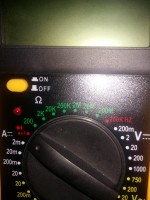Hello,
I accidentally shorted the lighter splitter on the Skoda Octavia 1. It stank and the electricity in the lighter is gone, but the splitter is working. I checked the fuse, but it's good. Where to look for the problem? Replace the cigarette lighter socket or some cube or something else?
I accidentally shorted the lighter splitter on the Skoda Octavia 1. It stank and the electricity in the lighter is gone, but the splitter is working. I checked the fuse, but it's good. Where to look for the problem? Replace the cigarette lighter socket or some cube or something else?



